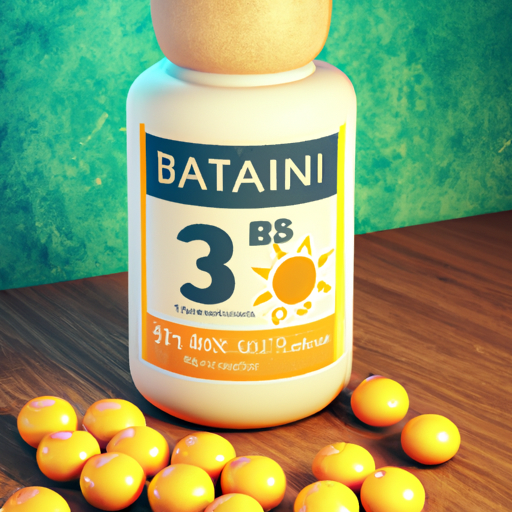1. Definition of Niacin
Niacin, also known as Vitamin B3, is an essential vitamin in our diets that plays a role in numerous metabolic reactions. It is necessary for the formation of energy, hormone production, healthy skin, and digestion. Niacin is found in many foods, including meat, fish, legumes, and fortified cereals.
Niacin is a type of medication used to treat certain types of cholesterol levels. It can also be used to help manage other conditions, such as diabetes and anxiety. Some people take niacin supplements to help fill in deficiencies when their food does not contain enough of the vitamin.
The following are the primary benefits of niacin use:
- It helps lower “bad” LDL cholesterol levels.
- It helps lower triglycerides levels.
- It helps raise “good” HDL cholesterol levels.
- It helps protect against heart disease, stroke, and atherosclerosis.
- It can lower blood pressure.
- It helps with nerve signaling and energy production.
However, like any medication, there are possible side effects when taking niacin. Some of the most common side effects include nausea, vomiting, stomach pain, and an uncomfortable flushing sensation. If you experience any of these side effects, consult with your doctor or pharmacist.
2. Sources of Niacin
Niacin, or vitamin B3, is essential for the maintenance of good health and can be obtained either through natural sources or via supplementation. Foods rich in niacin include fish, poultry, beef, organ meats such as liver, eggs, nuts, peanuts, beans, and fortified cereals. Vegetarians should look to dietary sources like mushrooms, tempeh, enriched grains and fortified soy products. The daily recommended intake is 14 to 16 milligrams per day for adults, and more for pregnant or breastfeeding individuals. Some people, however, may benefit from supplements, which can come in various forms including tablets, capsules, liquid, and powder. Before taking any supplement, it’s best to consult with a healthcare professional to make sure it’s the right choice for you.
3. Potential Recommended dosages
When it comes to taking niacin, potential recommended dosages can vary based on a few factors, such as age, weight, overall health and the condition being treated. It is important to understand that niacin can be beneficial in small doses, however, it can also be harmful if taken in excess. It is best to consult a doctor or healthcare practitioner before taking niacin in any form, as they will be able to provide guidance on the appropriate dosage for you. Furthermore, it is also important to note that consuming niacin in large quantities can lead to a variety of side effects, including flushing, headaches, nausea and digestive issues. As such, it is important to be mindful when taking niacin and to make sure that you are not taking too much or too little.
4. Excess Symptoms
Excess symptoms of Niacin, also known as Vitamin B3, although uncommon, can occur in people who are taking high doses of this vital nutrient. The most common symptom of excess Niacin is flushing, as well as itching and tingling of the skin. This is caused by dilation of the blood vessels and can last for up to an hour. People may also experience nausea, vomiting, and abdominal pain. Other rarer symptoms include liver damage, increased blood sugar, gastrointestinal problems, and headaches. It is important to consult a physician before taking large doses of Niacin, as serious health problems can occur if too much is taken.
5. Potential Effects on Health
Niacin, also known as vitamin B3, is an essential nutrient for human health. Though it’s an important part of many people’s diets, taking too much of it can cause unpleasant and potentially dangerous effects. Here are five potential health effects of excess niacin intake:
- Skin rash
- Liver damage
- Gastrointestinal discomfort
- Headache
- High blood sugar levels
In addition to these physical effects, excessive niacin intake can also result in a range of psychological symptoms such as anxiety, irritability and depression. If you believe that you may be taking too much niacin, it’s important to talk to your doctor to determine the best course of action.
6. Recommendations For Managing Excess Niacin Intake
When high doses of niacin are taken, managing excess niacin intake can be important to avoid long-term effects on health. Here are some recommendations for managing niacin consumption:
- Read the label of any supplements carefully and ensure the product does not exceed the daily recommended amount of niacin.
- Discuss with a doctor if a product with a high dose of niacin is necessary to treat a health condition.
- Decrease intake of other foods that can contain high amounts of niacin, such as fortified cereals and grain products.
- Include more foods in the diet that are naturally rich in niacin, such as legumes, fish, poultry, red meat, and nuts.
- Supplement with a multivitamin that contains a moderate amount of niacin in order to prevent vitamin deficiency.
- Monitor the signs of niacin overdose such as abnormal sweating, nausea, dizziness, headache, and lethargy.
Taking niacin as part of a balanced diet or supplementing with appropriate quantities of niacin can help to maintain a healthy body. If high dose niacin products are needed, it is important to follow the advice of a healthcare professional. Excessive amounts of niacin in the body can cause a variety of adverse effects and long-term health risks.





No Comments